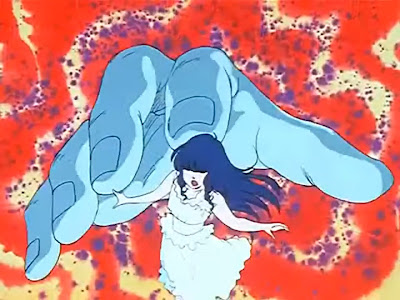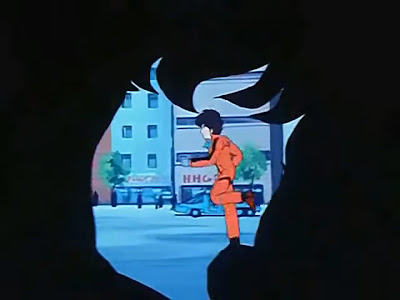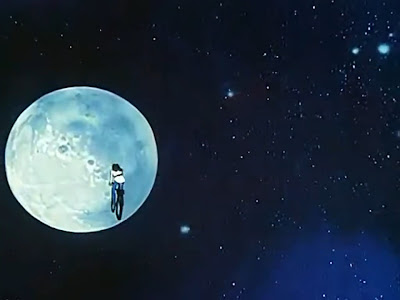 |
| Minmay is kidnapped. In a nightmare, hence the giant hand. |
Original Air Date - Macross: Feb. 13, 1983.
Directed by: Noboru Ishiguro.
Original Air Date - Robotech: Mar. 26, 1985.
Story Editor: Steve Kramer. Supervising Director: Robert V. Barron.
PLOT - MACROSS:
Hikaru has been seriously injured in battle with the Zentradi. Now he lies unconscious in a hospital bed, his subconscious trying to stitch together the events of the past year.
In his dream, he is still a civilian, watching Minmay's latest concert. Mid-performance, Zentradi leader Britai appears and kidnaps her. Hikaru is determined to rescue the woman he loves... but every time he begins, he ends up being shot down. And when he finally reaches Minmay, she seems less than excited at the rescue...
PLOT - ROBOTECH:
Rick has been seriously injured in battle with the Zentraedi. Now he lies unconscious in a hospital bed, machines monitoring both his physical condition and his delusions as his subconscious tries to stitch together the events of the past year.
In his dream, he is still a civilian, watching Minmei's latest concert. Mid-performance, Zentraedi leader Breetai appears and kidnaps her. Rick is determined to rescue the woman he loves... but every time he begins, he ends up being shot down. And when he finally reaches Minmei, she seems less than excited at the rescue...
 |
| Even unconscious, Hikaru can't stop chasing Minmay. |
CHARACTERS:
This episode focuses on Hikaru's would-be relationship with Minmay. He has spent the first half of the series obsessed with her. For her part, she's vacillated between periods in which she's encouraged his interest and ones in which she's treated him as practically a stranger. He believes her attitude toward him changed after she became famous. If you actually rewatch a couple of the early episodes, however, her hot/cold behavior started before that point.
The script does a good job of layering elements of Hikaru's character. He's still very young, so it's not surprising that his subconscious stitches together a juvenile hero fantasy in which he proves himself by rescuing the girl. For the most part, however, the Zentradi become a substitute for all the forces he blames for keeping him and Minmay apart: her career, her schedule, and - most specifically - her cousin. And yes, all the things he blames are entirely to do with her and not him.
Despite this, even in a dream he isn't able to blot out the level of the threat posed by the Zentradi. Not very many episodes ago, he watched their fleet destroy a planet. That memory is too vivid, and it and other anxieties break through into the Hero Story his brain wants to create.
Another interesting element is that, every time Hikaru tries to rescue Minmay, he ends up crashing. "Whenever I fly, I get shot down," he laments, his injury appearing to have shaken his confidence. His subconscious attempts to circumvent this by having him fly a "magic bicycle" - but that ends just as badly.
Advantage: None.
NARRATION:
Macross starts by reading out the details of Hikaru's crash and condition, as if from an official report. After that, there is no narration at all until the "Next Time" blurb.
Robotech has the traditional opening recap. It also ends with the narrator responding to Rick's, "It was just a dream," statement at the end. In between, the only narration is the typical Act Break mini-recap. However, every cut back to Rick's hospital bed is accompanied by the medical machines informing us of his physical and mental state, which serves basically the same purpose - and is as overdone as many of Robotech's expository voice-overs have been.
I prefer the Macross approach, which helps to boost the atmosphere by just taking us through the nightmare. By breaking away from the dream for multiple bits of quasi-narration, the Robotech episode undercuts the dreamlike atmosphere that is one of the episode's biggest assets.
Advantage: Macross.
 |
| Hikaru hallucinates a bit of the opening credits. In Macross, this is accompanied by the theme song. |
CUTS AND ALTERATIONS:
Minmay's Music: The Macross version of this episode gives Minmay at least three songs, one of which ("Zero-G Love") is quite catchy. Robotech sticks Minmei with, "To Be in Love," a track so treacly that it did the impossible and made me actually miss "This Is My Time to Be a Star."
Opening Titles Takeoff: Both versions see the hero going through the takeoff procedure from the opening credits. Macross makes this into a meta joke, playing the theme song over Hikaru's launch - then cutting the music off when he gets shot down. Robotech drops the self-referential gag, playing the visuals out with launch chatter over Rick's takeoff. Pity - It was a good gag, one that would have been easy to recreate with the Robotech theme.
Hikaru Suffers a Lot More Humiliation than Rick: Within the dream, both Hikaru and Rick keep getting shot down when they attempt to rescue Minmay. In Macross, each of Hikaru's failures is punctuated by the laughter of onlookers, with the shipwide announcer dubbing him "The Crash King." In Robotech, Rick is only actively mocked once, while the women on the bridge crew express admiration for his refusal to give up.
Rick Becomes More Aware of Reality: As the episode nears its end, the Robotech writers have Rick become more aware of reality. I actually think this is the one change that's for the better, as it indicates that his consciousness is reasserting itself. When he relives the events of Episode Four, in which he and Minmei were trapped in an isolated section of the ship, he calmly tells her that they will be found in two weeks. He also complains about Minmei falling asleep every time he tries to discuss anything important and even comments on his growing affection for Lisa.
Advantage: Macross. One change for the better doesn't make up for the other changes being for the worse.
INCIDENTAL MUSIC:
Both episodes use their scores to good effect. Macross is more artful, using Minmay's songs as incidental music. Robotech doesn't have that luxury (the less we have to hear of Minmei's songs, the better), but it makes up for it courtesy of its more dynamic soundtrack.
Advantage: None.
 |
| Hikaru attempts to fly a bicycle into space. It doesn't go well. |
OVERALL ADVANTAGE: MACROSS:
By immersing the viewer in Hikaru's dream, Macross manages to be more effective overall. It also helps that Macross's Minmay can sing, and that this episode gives her some new songs. That said, I did like some of the changes to Robotech's ending - just not enough to consider it the stronger overall version.
OTHER MUSINGS:
The second clip show in a span of four episodes. Dramatically speaking, that's at least one too many; but I'm inclined to give it a pass, since I'm pretty sure the first clip show at least was a response to production realities.
Phantasm makes considerably more creative use of the clip show format than Global Report did. Instead of just a straight retelling, the clips are used to explore Hikaru's emotional state. Small bits of new footage are intercut to strong effect, particularly the use of Kaifun. As a bonus, any minor visual discontinuities can be shrugged off as confusion from Hikaru's dream state.
Overall, this was an engaging and interesting story, and one of the better clip shows I can recall watching.
Overall Rating: 7/10.
Previous Episode: Kung Fu Dandy/Battle Cry
Next Episode: Pineapple Salad/Farewell Big Brother
Review Index
To receive new review updates, follow me:
On BlueSky:
On Threads:


No comments:
Post a Comment